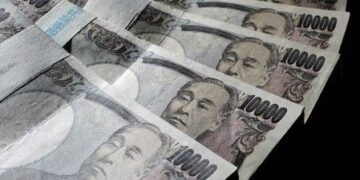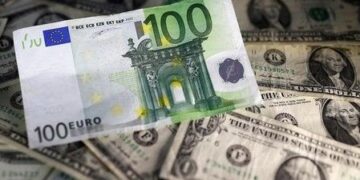This article originally appeared on PolitiFact.
When a reporter asked President Donald Trump why he paused country-by-country tariffs only a week after unveiling them, Trump said “Well, I thought that people were jumping a little bit out of line. They were getting yippy, you know? They were getting a little bit yippy, a little bit afraid.”
WATCH: Brooks and Capehart on Trump’s tariffs and reaction from the markets
Trump’s April 9 explanation came a day after the S&P 500, a broad stock market gauge, fell to 19 percent below its most recent peak, which had come in mid-February.
Americans with investments, retirement savings or pensions reliant on the stock market were feeling the squeeze of that decline. But economists and other financial observers suspected that the stock market decline may not have been the most important factor pushing Trump to pause these tariffs.
The likelier culprit: the bond market.
In February 1993, Democratic political strategist James Carville offered The Wall Street Journal a timeless characterization of the bond market’s influence:
“I used to think if there was reincarnation, I wanted to come back as the president or the pope or a .400 baseball hitter,” Carville, an adviser to then-President Bill Clinton, said. “But now I want to come back as the bond market. You can intimidate everybody.”
Economists agree that the bond market profoundly shapes the U.S. and global economies. Here are some questions and answers about how it works, and why Americans should care.
What is the bond market?
“The bond market” refers to the market for U.S. government bonds, which range in maturity from one-month Treasury bills to 30-year Treasury bonds. A bond “allows one party to borrow from another and then repay the loan on pre-specified terms,” said Anastassia Fedyk, an assistant professor of finance at the University of California-Berkeley’s Haas School of Business.
Anyone can purchase bonds. If you hold a bond to its maturity, its interest rate remains at the rate that was established when it was issued; this is considered a relatively safe and stable strategy, because you know going in what you will get in the end.
But you can also sell bonds before they mature, to take advantage of other investors’ financial needs at a given moment. Depending on market conditions, you could end up selling a bond for less than it’s denominated for — that is, less than its face value in dollars plus its interest rate — or you could end up selling it for more than that.
The market for bonds depends on two key metrics. One is the price, which is what someone will pay to buy a bond that hasn’t yet matured. The other is the yield, which is the bond’s return on your investment.
As the price you pay for a bond goes up, its yield will go down. Mathematically, this makes sense: You are paying more for the bond, so what you make off the bond will go down. Alternatively, if you are paying less for a bond, the yield will go up.
“A basic law of finance is if you don’t want to buy a bond, the seller has to lower its price to make it attractive to you,” said Moshe Lander, a senior lecturer in economics at Concordia University. “And when that happens, the yield goes up. You have to entice someone with a better return.”
Why is the bond market so important?
When bond yields rise, the cost of every other type of borrowing — credit cards, mortgages, business loans, financing the federal debt — increases.
That’s because historically, U.S. Treasury bonds have been considered the marketplace’s safest investments. For decades, the U.S. government has been big, stable and reliable. In a worst-case scenario, it’s a sovereign entity that can print money to pay off its debts (though not without negative economic consequences, notably inflation).
Compared with the federal government, every other bond issuer or lender — states, cities, corporations, banks and other financial institutions — is a little, or a lot, riskier. So their interest rates are always higher than the federal government’s. And if the federal government’s interest rates rise, the interest rates for these other institutions will rise, too.
“When it becomes more costly for the government to borrow, it also gets more costly for firms and households to borrow,” said Joseph Steinberg, a University of Toronto associate professor of economics.
This is a problem for the broader economy. Higher borrowing costs make it harder for companies to invest and expand, and make it harder for consumers to pay for the things those companies produce, from groceries to appliances to new homes. This can become a vicious cycle.
Higher interest rates also add to the federal government’s debt load. In this scenario, newly issued federal bonds, which are used to finance the federal government’s debt, will need to have a higher interest rate. This means the government will have to pay more for every dollar it borrows going forward, and these higher interest payments risk crowding out other priorities the government wants to spend money on, from Social Security benefits to military salaries.
What happened to the bond market recently?
After Trump’s tariff announcement on April 2 — a plan that many investors saw as more far-reaching than they’d expected — a lot of investors chose to sell off U.S. government bonds.
These investors sold their bonds because they saw increased “risk and uncertainty” for the U.S. economy in a higher-tariffed future, Fedyk said. “This pushed bond prices lower, and yields higher,” she said. “The change was pretty dramatic, with 10-year yields going from under 4 percent all the way to 4.5 percent on April 8.”
READ MORE: Stocks jump, bonds swing while falling U.S. dollar indicates more fear amid trade war
Investors’ declining confidence in the U.S. economy portended a future in which both U.S. government bonds and other types of lending would see higher interest rates, which would have a negative impact on the economy.
But the hurt didn’t stop there, finance experts say. “What’s going on now suggests that the U.S. government has lost its appeal as a source of safe assets,” Steinberg said.
Steinberg said an economic downturn “is usually associated with a drop in bond yields,” not an increase. That’s because in times of uncertainty, parking money in the U.S. — and in U.S. bonds in particular — is seen as safer than the alternatives. This drives up demand for U.S. bonds, meaning higher prices — and lower yields.
The opposite was happening after Trump announced his tariffs.
If the U.S. had been looking like a strong economy in the months and years ahead, “yields should be coming down,” Lander said. “If they’re going up, that suggests that inflation and risk are rising.”
Trump’s moves “spooked the market,” Lander said.
Did Trump’s 90-day pause reassure investors?
In the April 9 announcement, Trump paused the specific tariffs his administration had calculated for virtually every country, though he kept in place a standard 10 percent tariff on every foreign product; he also kept existing tariffs on Canada and Mexico in place and raised tariffs on China.
Despite his announcement, “it doesn’t appear that the 90-day pause has done much to reassure investors,” Steinberg said.
The yield for five-year Treasury notes fell between mid-February and Trump’s April 2 announcement — a favorable development for the U.S. Then, from April 2 to April 9 — the day he announced the 90-day pause — the yield for the five-year note rose. Its yield peaked on April 11, then proceeded to fall through April 14, but only to a level that was still well above its pre-April 2 level.
“There is still a lot of uncertainty remaining, including what will happen at the end of the 90 days and how the trade war with China will evolve,” Fedyk said.













